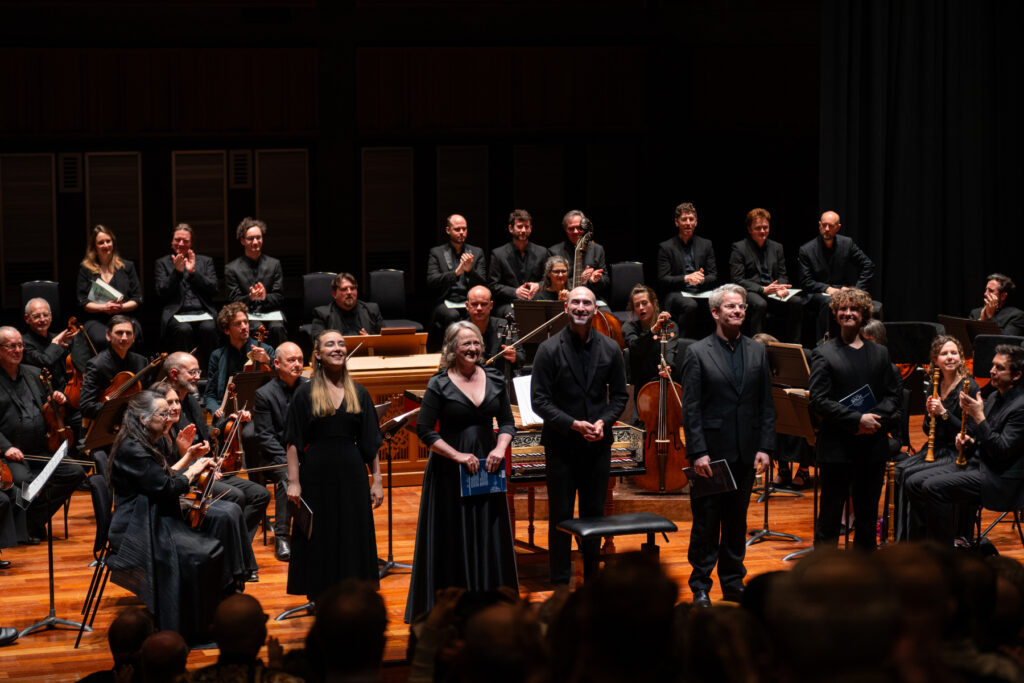If Holy week is usually a time for Christian meditation, this concert at the Queen Elizabeth Hall given by the Choir and Orchestra of the Age of Enlightenment traded solemn reflection for jubilation in the shape of two seldom-performed Easter cantatas and the no less rarely heard Easter Oratorio. There’s no great justification for the neglect of these works, each possessing gratifying arias (somewhat lengthy in the Oratorio) with much welcome obligato colouring and some uplifting choruses to bring unfailing interest. Understandably, the Bach Passions are more popular than these works, but there is still plenty to enjoy in BWV 249, an early Leipzig work that Bach himself prized highly and which began life as a birthday cantata in 1725.
Proceedings began with Erfreut euch, ihr Herzen, BWV 66, a cantata for Easter Monday and, like the Oratorio, adapted from a now lost work of secular origin. Even with just a single trumpet with oboes and strings, one could be in no doubt of the festive spirit coursing through the opening chorus, but within its 17-strong vocal line-up the sopranos were underpowered, never quite projecting enough from behind the orchestra. And perhaps had the schoolboy enthusiasm of director Peter Whelan spent less time micro-managing the orchestra, the results might have been less overheated, his bracing tempi less feverish. Three soloists, however, acquitted themselves admirably; Malachy Frame (baritone) gave thanks for Christ’s resurrection, while an earnest Rebecca Leggett (mezzo-soprano) and a reassuring Ruairi Bowen (tenor) fashioned a well-matched partnership in their flowing dialogue between the allegorical figures Fear and Hope, both ardently expressive.

Matters were more relaxed in Bleib bei uns, BWV 6 (Easter Monday 1725), the day’s end wistfulness of the opening chorus relating to the disciples’ fretful journey to Emmaus; it was beautifully rendered, its sarabande-like gestures reminiscent of ‘Ruht wohl’ from the St John Passion. Sopranos were impressively pure in their chorale movement, floating serenely over continuo and obligato cello, while the alto and tenor arias, with their preoccupation with the continuing light of Jesus, drew singing of rapt intensity. Viola obligato (rather than the alternative scoring of oboe da caccia) and pizzicato continuo provided stylish support for the first aria, and recurring string triplet figures provided a dancing counterpoint for the second.
There was much to admire in the Easter Oratorio where the full glory of the resurrection was implicit in Bach’s deployment of three trumpets and drums, heard to impressive effect in the opening and closing choruses. After an exultant Sinfonia, Daniel Bates’s poignant oboe (within an Italian-sounding ‘Adagio’) reminded us of earlier events in the Easter story, its sobriety swept aside in fanfare gestures and bustling choral exchanges imparting the news of the empty tomb. This splendid three-part opening ought to be, in some small measure, a vigorous defence for those who regard the Easter Oratorio as a poor relation to the Passions. Perhaps if the work provided more opportunities for the chorus, this Oratorio might be less neglected. But this outing (with tempi now less frantic than earlier in the evening) brought some spellbinding performances.
Honours were shared equally between the mesmerising slumber song (‘Sanfte soll mein Todeskummer’) for two obligato recorders and tenor, Lisa Beznosiuk’s flawless flute was an eloquent counterpart to Miriam Allan’s enchanting aria ‘Seele, deine Spezereien’ and an impeccably delivered ‘Saget, saget mir geschwinde’ where Rebecca Leggett (singing from memory) held us in thrall with her ecstatic craving to see the risen Lord. Commentators who think these arias are ‘interminably long’ might wish to reconsider given the emotional and pictorial drama of these standout performances. With communication as powerful and expressive as this, the OAE has raised Bach performance to a new level. We had an outstanding Christmas Oratorio from this period instrument ensemble last December, now the group should turn its attention to Bach’s Ascension Oratorio.
David Truslove
J.S. Bach: Erfreut euch, ihr Herzen, BWV 66, Bleib bei uns, denn es will Abend werden, BWV 6, Oster-Oratorium, BWV 249.
Miriam Allan (soprano), Rebecca Leggett (mezzo-soprano), Ruairi Bowen (tenor), Malachy Frame (baritone), Choir and Orchestra of the Age of Enlightenment, Peter Whelan (director).
Queen Elizabeth Hall, London, Wednesday 27 March 2024
All photos by Zen Grisdale courtesy of The Orchestra of The Age of Enlightenment.